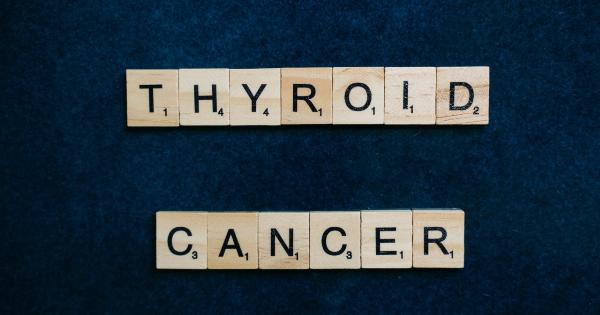Thyroid cancer is a type of cancer that occurs in cells found in the thyroid gland. The thyroid gland is a small butterfly-shaped gland located in the neck, just below the larynx.
Its main function is to produce hormones that regulate the body’s metabolism, growth, and other vital functions. While thyroid cancer is relatively rare compared to other types of cancer, it is still a serious health concern that can have a significant impact on a person’s life.
Types of Thyroid Cancer
There are four main types of thyroid cancer, each with its own unique characteristics and prognosis:.
Papillary Thyroid Cancer
This is the most common type of thyroid cancer, accounting for about 80% of all cases. It usually grows slowly and is often curable if caught early. Papillary thyroid cancer typically affects women more than men and can occur at any age.
Follicular Thyroid Cancer
Follicular thyroid cancer is less common than papillary thyroid cancer, accounting for about 10-15% of cases. It also grows slowly and can be treated effectively if detected early.
Follicular thyroid cancer is more common in women than men and is often seen in older adults.
Medullary Thyroid Cancer
Medullary thyroid cancer is a rare form of thyroid cancer that accounts for about 4% of all cases. It begins in the cells that produce the hormone calcitonin and can spread to other parts of the body.
Medullary thyroid cancer can be hereditary and is often associated with other endocrine disorders.
Anaplastic Thyroid Cancer
Anaplastic thyroid cancer is the most aggressive form of thyroid cancer, accounting for less than 2% of all cases. It grows rapidly and can spread to other parts of the body quickly.
Anaplastic thyroid cancer is most commonly seen in older adults and is often fatal.
Symptoms of Thyroid Cancer
The symptoms of thyroid cancer can vary depending on the type and stage of the cancer. Some common symptoms include:.
- A lump or swelling in the neck that can be felt or seen
- Hoarseness or difficulty speaking
- Difficulty swallowing or breathing
- Persistent cough
- Pain in the neck or throat
- Swollen lymph nodes in the neck
- Changes in voice
Diagnosis
Thyroid cancer can be diagnosed through a variety of tests, including:.
- Physical exam
- Ultrasound
- Biopsy
- Blood tests
- CT scan
- MRI
Treatment Options
The treatment options for thyroid cancer depend on the type and stage of the cancer, as well as the patient’s overall health. Some common treatment options include:.
Surgery
Surgery is the most common treatment for thyroid cancer. The goal of surgery is to remove as much of the cancer as possible while preserving the surrounding tissue and organs. In some cases, the entire thyroid gland may need to be removed.
After surgery, patients may need to take thyroid hormone replacement therapy.
Radiation Therapy
Radiation therapy uses high-energy radiation to kill cancer cells. This treatment is often used after surgery to kill any remaining cancer cells or to treat cancer that has spread to nearby lymph nodes.
Radiation therapy can be given externally or internally (brachytherapy).
Chemotherapy
Chemotherapy uses drugs to kill cancer cells. This treatment is usually used for anaplastic thyroid cancer or when cancer has spread to other parts of the body. Chemotherapy can be given orally or intravenously.
Targeted Therapy
Targeted therapy uses drugs that target specific proteins or molecules that are involved in the growth and spread of cancer cells. This treatment is often used for medullary thyroid cancer or when other treatments have failed.
Prevention
Since the exact cause of thyroid cancer is unknown, there is no surefire way to prevent it. However, there are several things you can do to reduce your risk:.
- Get regular check-ups and screenings
- Do not smoke
- Maintain a healthy weight
- Eat a healthy diet that is rich in fruits and vegetables
- Avoid excessive exposure to radiation
Conclusion
Thyroid cancer is a serious condition that can have a significant impact on a person’s health and wellbeing.
However, with early detection, proper treatment, and lifestyle changes, many people with thyroid cancer are able to lead long and fulfilling lives. If you suspect that you may have thyroid cancer, it is important to speak with your doctor as soon as possible to get a proper diagnosis and treatment plan.



























